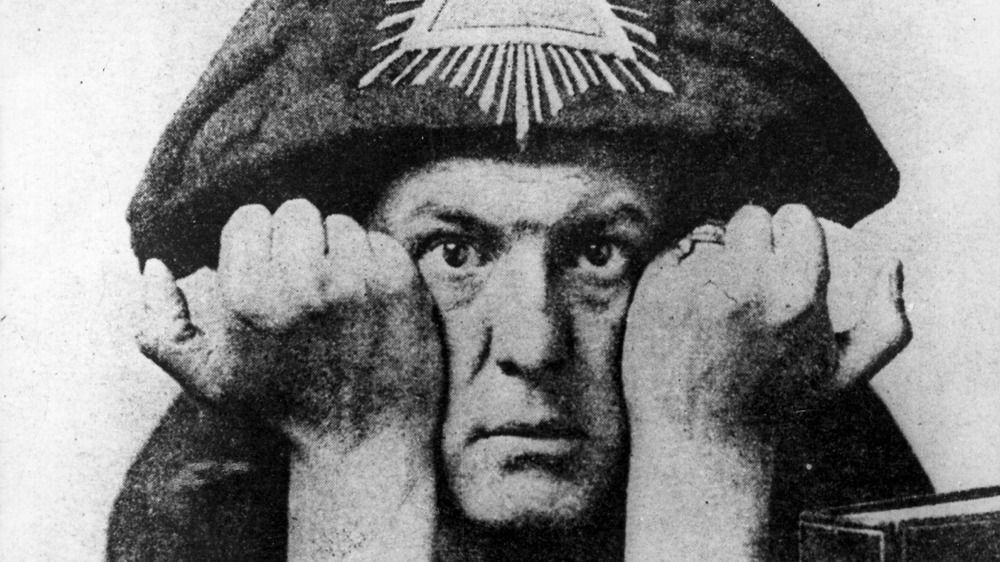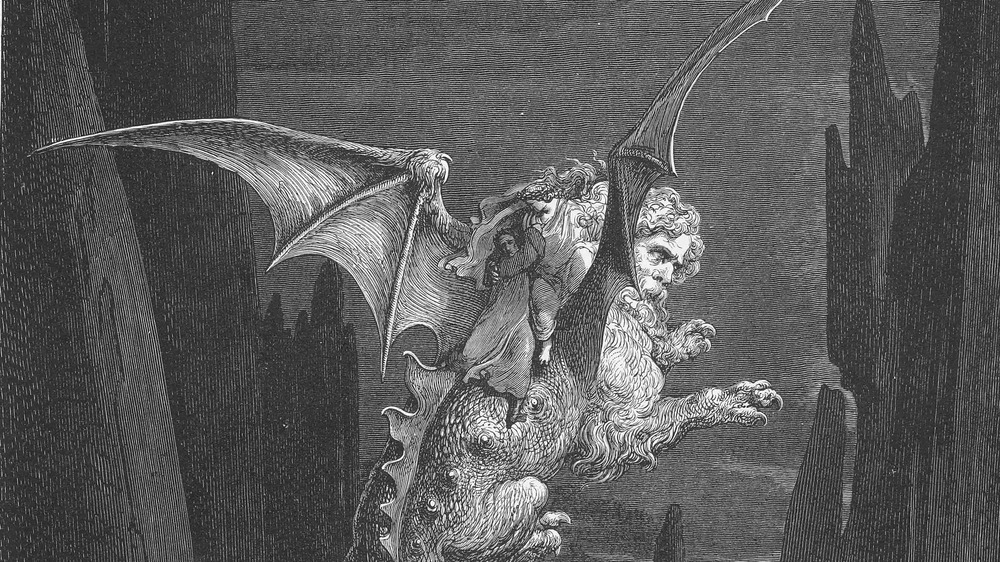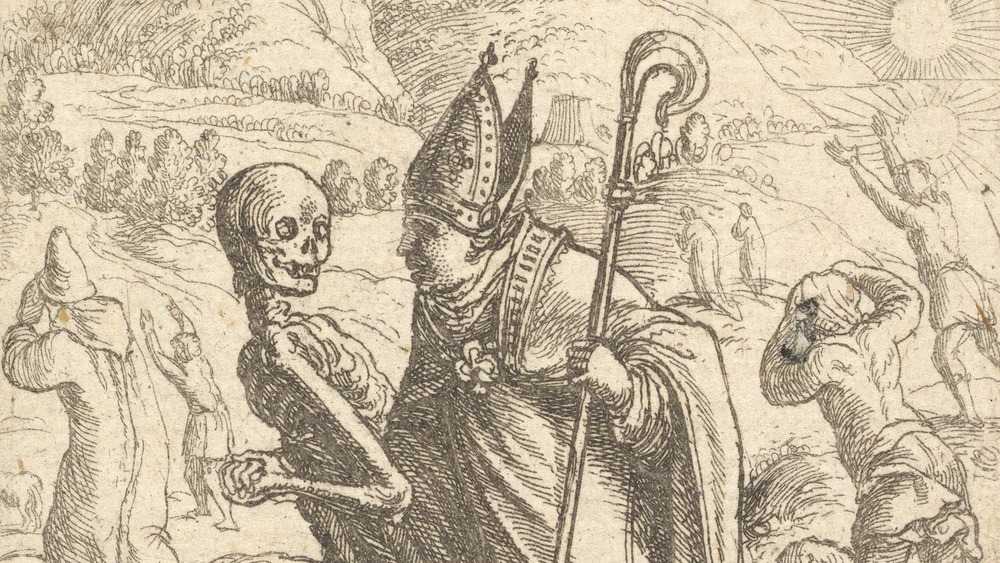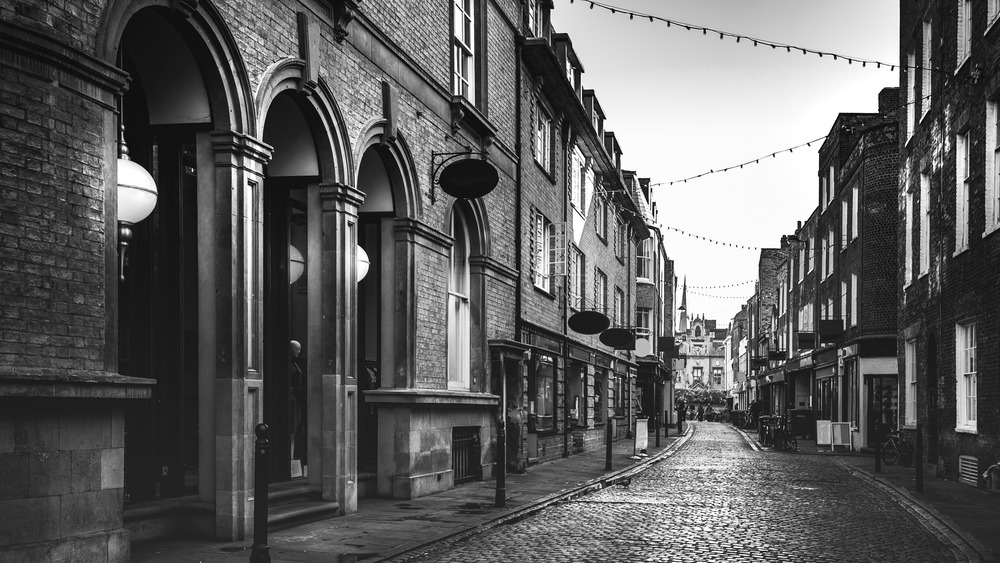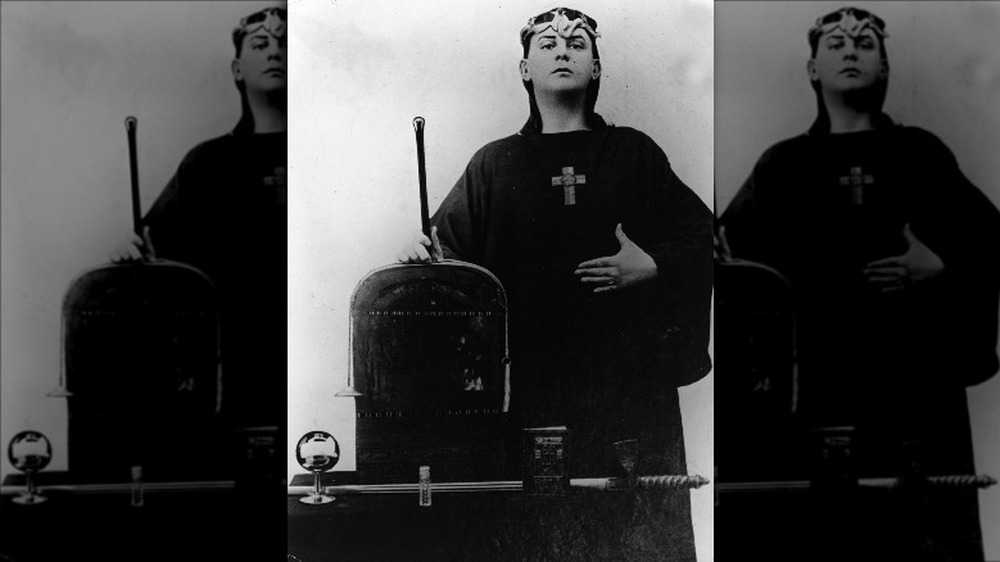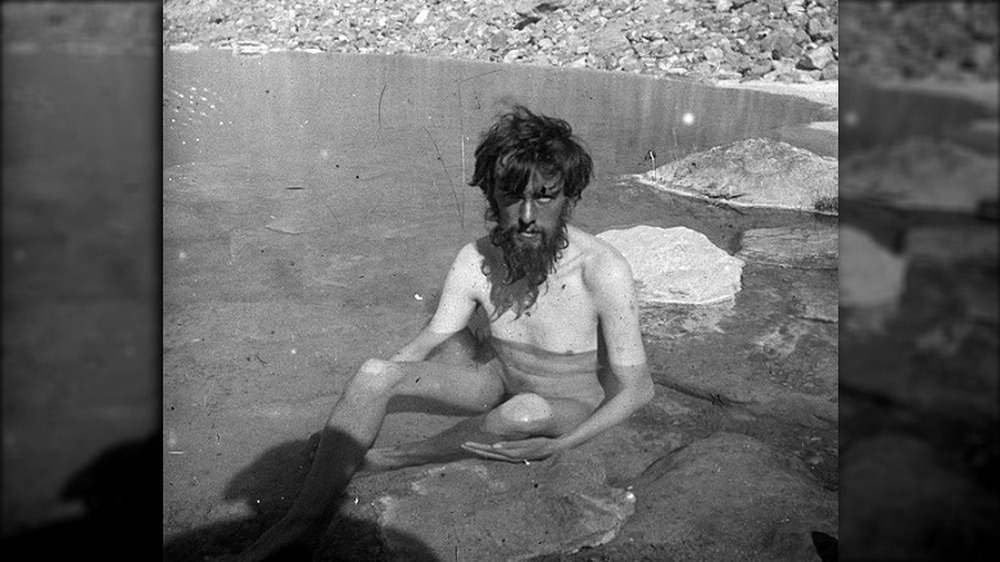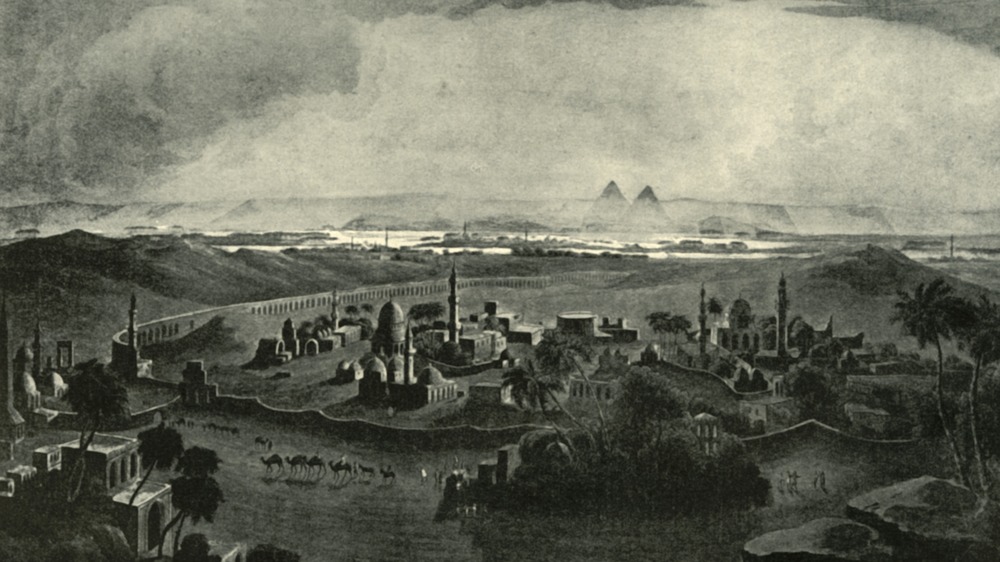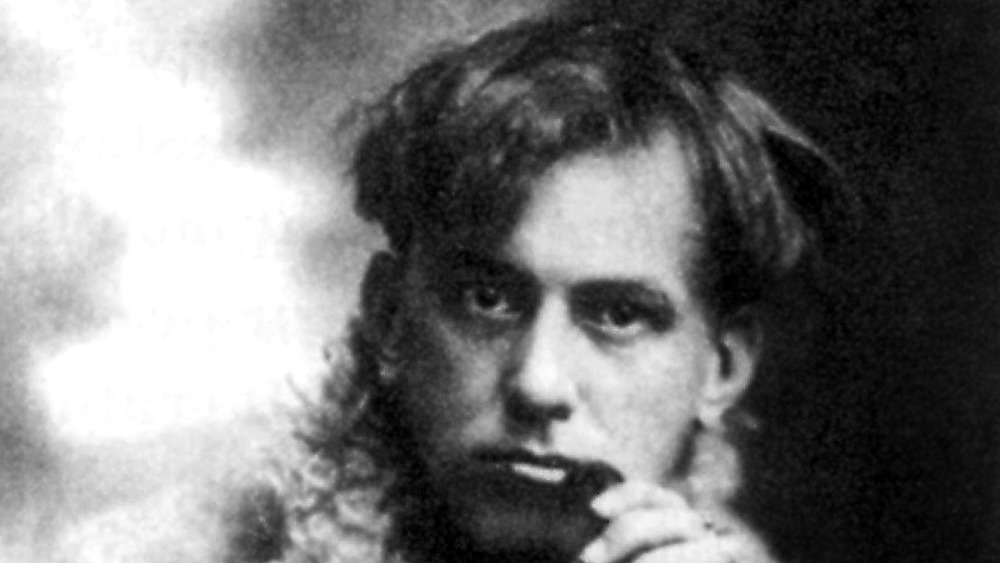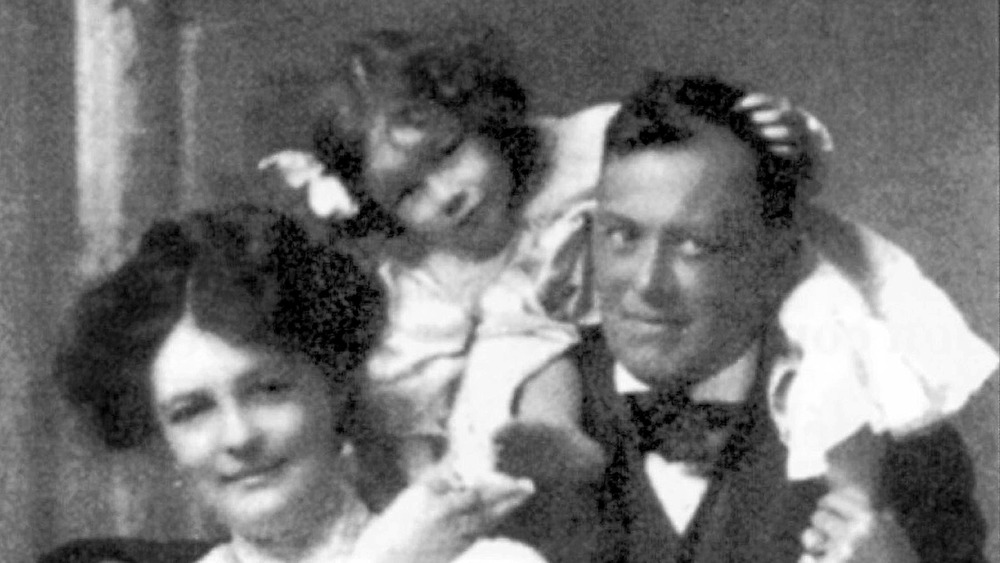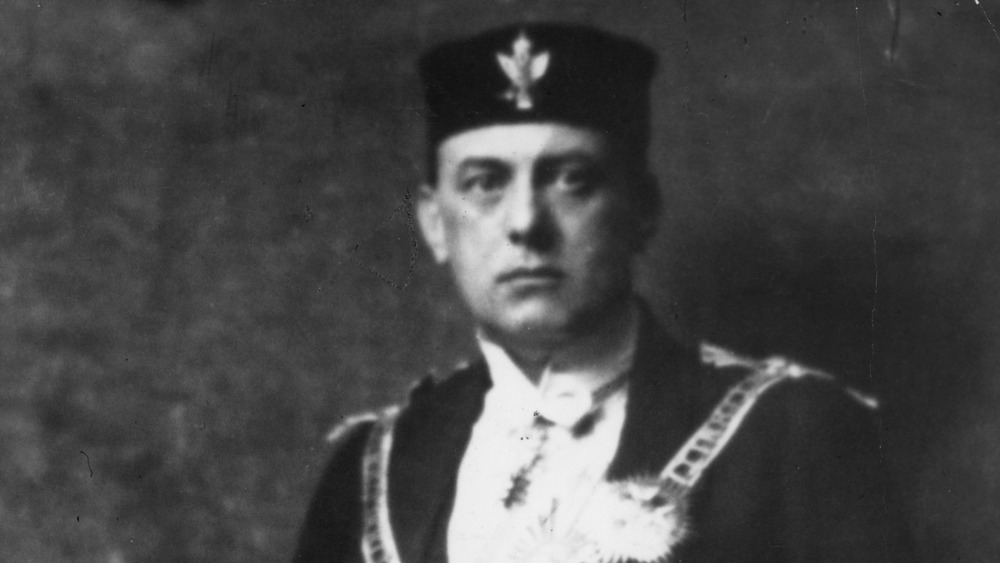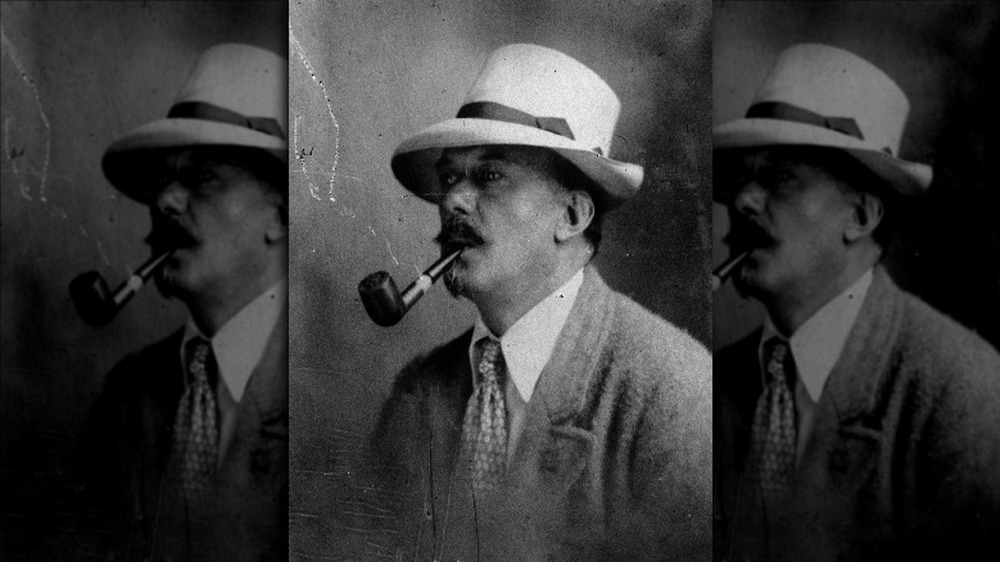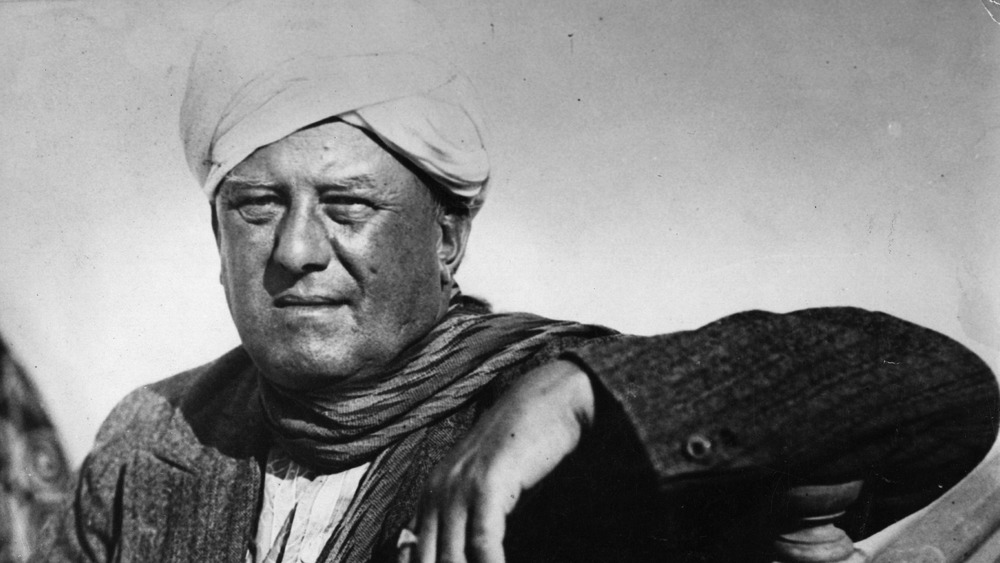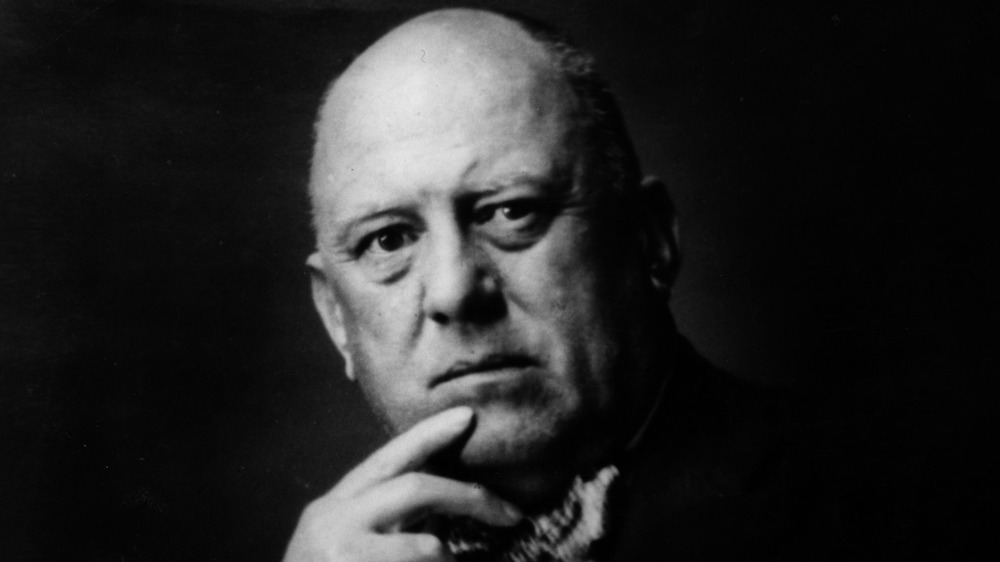The Messed Up True Story Of English Occultist Aleister Crowley
"He had upon the center of his heart four hairs curling from left to right in the exact form of a Swastika."
So claimed the British occultist Aleister Crowley — speaking in his Confessions and in the third person — of his own appearance upon entering the world on Oct. 12, 1875. The detail is one of a number that Crowley, whose birth name was Edward Alexander Crowley, interprets as "distinguishing marks of a Buddha," prefiguring the role he believed to be his in later life. Crowley would develop a great range of talents, from poetry and chess to mountaineering, but all of these would come to serve as satellite occupations through which to gain a greater understanding of black "magick."
Occultism was a common interest among the British upper classes around the turn of the 20th century, but Crowley was notorious in his own day for the dark forces he was willing to employ in his ritual use of magick and the subversive and joyously immoral nature of much of his writing and personal life. From his birth to his death, Crowley's life and ideas were so messed up that he has become a cult figure who has influenced countercultural movements and mystical organizations ever since.
Young Aleister Crowley, "The Beast"
Aleister Crowley was born into an affluent family who had grown rich through the family business, "Crowley's Ales." His father, Edward, had retired from the business by the time his son was born to become an evangelist for the Plymouth Brethren, a fundamentalist Christian sect whose beliefs included the imminent return of Christ and the necessity of vigilant repudiation of Satan. While Edward would read a passage of the Bible to the Crowley family after breakfast each day, it was the young Crowley's mother, Emily, who enforced the family's strict spiritual beliefs at home, according to the biographer Lawrence Sutin.
Emily was strict with her son, banning a great deal of literature and preventing him from pursuing interests she felt would divert him from his spiritual development. Sutin notes that in his memoir, The Confessions of Aleister Crowley, the occultist recalls with regret saving his mother's life when out walking together on a precipice as a teenager. Elsewhere, he describes how strict adherence to the Bible had made his mother "insane." Emily reportedly believed her mischievous and egotistical son was the Devil himself, bestowing upon him a nickname that he would hold onto for the rest of his life — the Beast.
Childhood grief, teenage rebellion
Some have interpreted Aleister Crowley's antipathy towards his mother as tongue-in-cheek, and her language towards him as, in a way, playful. Though the devout Christian beliefs of his parents deprived the young Crowley of certain indulgences, there is some evidence that he was spoiled and that his parent's religious fanaticism gave Crowley the sense that he was morally superior to those around him.
Crowley adored his father especially and underwent a striking transformation, he tells in Confessions, after losing his father to tongue cancer when he was just 11 years old. Lawrence Sutin argues that it was the realization that Christianity was powerless to stop death that turned Crowley against his family's faith with a newfound sense of revulsion. However, Crowley also inherited a third of his father's vast wealth after his death, sowing the seeds of the libertine habits that would last his whole life. The young Crowley began to attract the ire of his teachers by deconstructing the Christian scriptures he was given to study, and as his teen years wore on he endeavored to stage his own private rebellion by smoking and soliciting the services of sex workers, from whom he contracted gonorrhea.
Experimentation at Cambridge University
Though rebellious, Aleister Crowley was undoubtedly highly intelligent and overcame the early limitations imposed on him by his mother by reading widely and developing interests in a many subjects. In 1895, Crowley enrolled at Trinity College, Cambridge, a prestigious institution whose alumni included such notable figures as the libertine poet Lord Byron. Crowley initially entered into the study of "moral science," focusing on philosophy. However, he was able to convince his supervisors to allow him to focus on the study of English literature, which was still a comparatively new subject.
Lawrence Sutin writes that Crowley's years at Cambridge were among the happiest of his life. Crowley was already a "man of means" by the age of 20 thanks to his formidable inheritance, and beginning his studies allowed him to put further distance between himself and the beliefs of his Christian family. His days instead were filled with his interests like poetry, mountaineering, chess — all pursuits he soon became adept in — as well as more subversive passions. Notably, Crowley came to explore concurrently his bisexuality and esoteric occultism. Sutin argues that Crowley's "sexual awakening" occurred on holiday in Stockholm and was experienced as akin to a "magical evocation," planting the seed for the "mystical quest" which would become the driving force behind Crowley as both a magician and a thinker.
Aleister Crowley joins the Hermetic Order of the Golden Dawn
Despite an acceptable academic performance, Aleister Crowley left Cambridge without a degree. Crowley had experimented with a number of esoteric practices while still a student, beginning with alchemy before, according to Lawrence Sutin, developing a deep interest in ritual magic and evocation. Crowley became an ardent student of the mystic A.E. Waite — the creator of a famous set of Tarot Cards — and his Book of Black Magic and Pacts. Such interests were unusual for the time but not uncommon, and Crowley found likeminded individuals among the members of The Hermetic Order of the Golden Dawn, a London-based secret society of occultists and magicians. Such groups were not considered cultish but rather part of an "enlightened and daring avant-garde," according to Sutin. After an initiation ceremony conducted by the order's leader, Samuel Liddell MacGregor Mathers, Crowley joined the order in 1898 under the magical name "Frater Perdurabo."
"The forces of good were those which had constantly oppressed me," Crowley wrote in his Confessions. "I saw them daily destroying the happiness of my fellow-men. Since, therefore, it was my business to explore the spiritual world, my first step must be to get into personal communication with the devil."
Though Crowley made swift progress through the ranks of the order, his wild behavior and feuding soon left him ostracized within the group.
Aleister Crowley's travels and marriage
Aleister Crowley possessed an "ardor and capacity for magical practice," according to Lawrence Sutin, and his magical development within The Hermetic Order of the Golden Dawn was undeniable to his rivals despite his unpopularity. Still well monied, Crowley rented rooms at the high-end Hotel Cecil on London's Chancery Lane, where he established his own temple for the private study of white and black magic with a separate room for each. Studying under the tutelage of fellow Golden Dawn member Allan Bennett, Crowley also began experimenting with the ritual use of drugs. Rumors of the extremity of Crowley's exploration of the craft meant he soon became a notorious figure among London's occultists.
But Crowley's wealth also allowed him to travel. In 1900, he travelled to Mexico, where he continued to practice ritual magic while scaling some of the country's highest mountains. Crowley then headed to the Far East, exploring Hong Kong and Japan before heading to India to continue his spiritual studies, and later attempted to scale K2, an adventure that came to an abrupt end when the young occultist was struck down with influenza.
After two years of extensive travel, Crowley arrived in bustling and bohemian Paris in 1902, where he mingled with artists and intellectuals and wrote an impressive amount of poetry. Paris was also the city where he would meet his future wife and magical muse, Rose Edith Kelly.
Aleister Crowley's haunting honeymoon in Cairo
Aleister Crowley met Rose Edith Kelly through her brother, Gerald Kelly, Crowley's close friend in Paris and a famous British artist in his own right who would later be knighted for his achievements. As ever, Crowley's taste for subversion meant that his relationship with Rose occurred in controversial circumstances, instantly unsettling the life and social circle he had been building for himself in Paris.
Like Crowley's own, Rose's background was devoutly Christian, and her parents, upon learning that she was having an affair with a married man, attempted to force her into an arranged marriage. Crowley came somewhat perversely to the rescue, eloping with Rose and marrying her in a discreet ceremony in Scotland and, according to Lawrence Sutin, destroying his friendship with Gerald in the process.
The marriage was ostensibly one of convenience. However, as Sutin reports, the act of marriage appears to have awoken something in the pair, and the months following were later described by Crowley as "an uninterrupted sexual debauch."
Keen to impress, Crowley organized a honeymoon in Cairo, Egypt, where the occultist performed the "Bornless Ritual," with the intention of summoning "sylphs" — elemental beings made of air. Frustratingly, Rose was unable to see the creatures. However, the spell had an unexpected effect. Rose fell into a trance. She began to repeat a phrase, "They are waiting for you!"
A new spiritual aeon and the book of the law
Aleister Crowley was initially unimpressed by his wife's outbursts, according to Lawrence Sutin, who says that the occultist became "vexed" by his wife's muddled reaction to the ritual. Two days later, on March 17, Crowley attempted to remedy things through an invocation of an Egyptian deity, Thoth, the ancient god of wisdom and magic, to make sense of his wife's continuous fragmentary utterances. Eventually, Rose Edith Kelly convinced Crowley that she was channeling messages from the god Horus, who said that a new "Equinox of the Gods" had come.
Believing that Kelly was unfamiliar with Egyptology, Crowley challenged his wife to identify Horus in a nearby museum. Kelly succeeded, pointing her husband to an exhibit uncannily numbered "666." Kelly had also revealed to Crowley that he was to "formulate a new link of the Order with the Solar Force," and prepare the world for the arrival of a new spiritual aeon.
Beginning April 8, Crowley claims that he too began to hear voices, which spoke to him "over his shoulder" as he sat at his writing table in his honeymoon apartments. Over the course of three days, Crowley believed he received instruction from a "superior intelligence" called Aiwass, a messenger of Horus who dictated to the occultist what would come to be known as The Book of the Law. The central tenet of the book is as follows — "Do what thou wilt shall be the whole of the law."
Fatherhood and tragedy
On July 28, 1905, Aleister Crowley and Rose Edith Kelly had their first child, Lilith — or, as Crowley had named her, according to Lawrence Sutin, Nuit Ma Ahathoor Hecate Sappho Jezebel Lilith, names derived from the kernels of the new religion found in Crowley's own Book of the Law.
That year, Crowley entered into publishing. The occultist was keen to publish a Collected Works of his own writing, but as his books were failing to sell sometimes even a single copy with his regular publisher, Kagan Paul, Crowley decided to strike out on his own, creating the satirically named Society for the Propagation of Religious Truth. Crowley also returned to mountaineering, according to Oxford DNB, attempting a misjudged ascent of the treacherous Himalayan mountain Kanchenjunga, which brought out the best and worst in Crowley.
His perseverance, skill, and bravery would see him through every mountain adventure through the course of his life, but as Sutin argues, his pettiness, arrogance, and contempt for his fellow climbers on his Himalayan team would serve to turn the expedition into a disaster. After the expedition splintered into two groups — one smaller group led by Crowley and another led by Jules Jacot-Guillarmod, a rival with whom he had violently clashed — an avalanche tragically killed four members of the group led by Guillarmod, an event Crowley later claimed to have foreseen.
On returning to England, Crowley would receive word that his daughter, Lilith, had also died of typhoid.
Thelema and The A∴A∴
Aleister Crowley blamed the death of Lilith on Rose Edith Kelly's growing alcoholism, but the tragedies he endured seemed in many ways to fulfil the life of extremities he had previously dreamed of experiencing. "I want blasphemy, murder, rape, revolution, anything, bad or good, but strong," Crowley had written to Gerald. Traveling through India it seems he got a further taste of his own desires, according to Lawrence Sutin, when he was forced to shoot at point blank range two men who attempted to rob him, forcing an end to his eastern travels.
In 1907 Kelly gave birth to a second child, Lola — whose name perversely recalls that of one of Crowley's contemporaneous extramarital lovers — while her husband immersed himself in black magic ritual, employing hashish as an aid to psychological transformation. Crowley claims in his Confessions that it was in such ritualized states that he composed, through communion with Aiwass, many of the texts that would become foundational to "Thelema," Crowley's own future mystical religion.
In November of the same year, Crowley decided the time was nigh to fulfill the destiny revealed to him by Horus and establish a new order through which Thelema could be disseminated — The A∴A∴ ("silver star"). Crowley had already made efforts to publish a great deal of secret material belonging to the Golden Dawn, effectively destroying it as a secret society. The A∴A∴ was to become a society built in Crowley's own image.
Aleister Crowley and World War 1
The A∴A∴ soon attracted a devote following among England's occultists, and the group formed a headquarters on London's Victoria Street. In 1909, Aleister Crowley also began publishing The Equinox, a magazine that was to act as the "organ" of Crowley's new society and feature articles on black magick and occultism more generally. Though published infrequently, the magazine would continue in one form or another until as recently as 1998.
But Crowley also gained publicity for the magick he would personally perform and for the rivalries and feuds he frequently engaged in, especially with ex-members of his old order, the Golden Dawn, whom he often accused of using magick against him. In the press, Crowley was described as a Satanist who secretly engaged in human sacrifice. Such attention was increasingly important to Crowley, whose lavish tastes and carefree spending meant that his inheritance was fast running out.
Crowley began staging drug-fueled public performances as a way of generating new members and more funds, and he reveled in his own notoriety. But the realities of World War 1 added a further aspect to his infamy. While in America, Crowley began to contribute bombastic articles to the pro-German magazine Fatherland. Though Lawrence Sutin demonstrates Crowley's claims that he was a double-agent may carry some weight, his behavior during the war years saw Crowley branded a traitor in his homeland.
The Crowley commune and the Abbey of Thelema
Aleister Crowley had divorced his wife Rose Edith Kelly before the war because of her alcoholism — though citing his own infidelity as reason for their separation — and soon after had her institutionalized. His extended travels around America left him penniless, and he returned to London in 1919 destitute and under attack from the British press. Worse still, Crowley's ill-health had begun to catch up with him. He began to suffer from chronic asthma attacks, and Lawrence Sutin reports that a doctor's prescription for heroin as a treatment for his ailment left the occultist addicted to the drug.
Crowley relocated to Paris in 1920, and it appears his poor health appears to have had little impact on his famous charisma. There, he formed around himself a polyamorous commune of followers of Thelema, whom he then relocated, with many young children in tow, to a property in Sicily — a location he had chosen in consultation with the I-Ching — to establish the Abbey of Thelema.
Crowley described the period as a happy one, and the abbey attracted many followers. However, reports arrived in the English press of the group's "sex magic" rituals, with one follower claiming she was forced to slice herself with a razor, and that her husband had fallen sick and died after drinking the blood of a cat.
Crowley attracted a new nickname — "The Wickedest Man in the World."
Aleister Crowley in obscurity
Benito Mussolini forced Aleister Crowley and his followers from Sicily, and in 1923 the occultist resumed his travels. Before the war, Crowley had assumed the leadership of yet another magical order, the Ordo Templi Orientis. Having left Sicily, he now found himself battling to maintain power of the group's warring factions, with members of the group in Germany disputing Crowley's ascension to the head of the group, according to Lawrence Sutin.
Nevertheless, Crowley continued to attract followers and lovers, and the 1920s saw him writing and publishing prolifically, though interest in many of his magical works waned. However, he was never far from controversy. In the 1930s, Crowley convinced himself that Adolf Hitler was likely to become a follower of Thelema, although the facist leader soon banned the German branch of Ordo Templi Orientis and suppressed occultism under the Nazi regime. Sutin reports that the 1930s also found Crowley in Portugal, attempting to fake his own death with the help of the famous poet Fernando Pessoa.
Around the same time, it was revealed that Crowley was spending three times his income and was forced to declare bankruptcy, foreshadowing the precarious finances that would trouble him for the rest of his life.
Crowley continued to write and teach magick to his followers but died in poverty, according to Britannica, of chronic bronchitis in a boarding house in Hastings, Sussex, on Dec. 1, 1947, at the age of 72.
